Take the Time to Explain (Michael Marçal)

One of the last steps in a doctoral program is the defense. This is where you, the doctoral candidate, after years of research, are presenting the results of your work in front of a panel of experts in your field who will judge if the merits of your results are worthy of a PhD. Years ago, I was fortunate to receive a PhD in mathematics from one of the most prestigious Applied Mathematics programs in the United States. One of the judges on my panel was a renowned mathematician in the field of numerical analysis. Something he said to me after my (successful) defense has stuck with me throughout my working career (not in mathematics!). He said, “Your thesis was one of the most lucid and clear theses I’ve read in many years. Thank you!” I was certainly gratified but also very surprised by his words. I had assumed that he, being a world-class mathematician, would “know all about it,” and just “watch” how my thesis would turn out. In fact, as he explained, he was able to do that, but only because I had taken the trouble to explain the basic ideas of the problem space and the motivations behind my ideas. I have never forgotten this lesson. Since then, after many years working in software and in large organizations, I have come to appreciate those comments even more.
We think our management “gets” what we do as technologists. Just “read the code, man!” The software we live and breathe every day ought to seem obvious to anyone working in technology, right? But it is not. Technology managers hire the best people (hopefully), who solve very difficult problems. But they don’t “get” it all. I’ve always been surprised how grateful senior technical managers have been when I can explain some very basic modern ideas (e.g., what’s this NoSQL stuff all about, and why should I care?) to them in a nonthreatening and non condescending way.
Recently, a senior business manager at work asked me privately about why it was important for us to migrate our traditional deployed fat client architecture to a hosted platform. He was under a lot of internal pressure to fund this effort, but he hadn’t a clue why this was necessary. He was also probably too embarrassed to ask publicly. I spent two very fruitful hours explaining (without PowerPoint!). I never hesitate nowadays to take the opportunity to explain basics and motivation to senior or junior members. It educates them without making them feel small, they learn to trust my judgment and advice, and we bring about change. Taking the time to explain is very important.
in Camille Fournier's The Manager's Path https://www.oreilly.com/library/view/the-managers-path/9781491973882/
